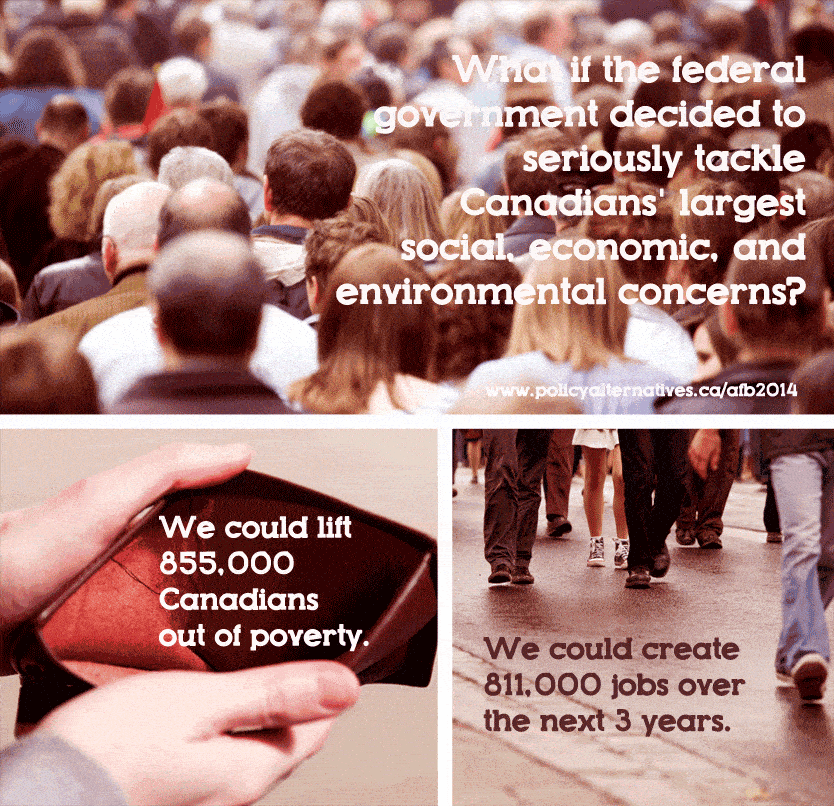 It is rare to hear a plan to reduce poverty, increase jobs, invest in housing and childcare as well as education and Aboriginal peoples while balancing the budget. It almost seems surreal considering the common discourse in the media and from government that generally speaks to funding cuts for programs, increased job loss, and tax benefits for the wealthy. Yet, an alternative to the norm is indeed possible and well within reach. If you want to know how, you’ll have to check out the Canadian Centre for Policy Alternative’s 2014 Alternative Federal Budget: Striking a Better Balance (AFB).
It is rare to hear a plan to reduce poverty, increase jobs, invest in housing and childcare as well as education and Aboriginal peoples while balancing the budget. It almost seems surreal considering the common discourse in the media and from government that generally speaks to funding cuts for programs, increased job loss, and tax benefits for the wealthy. Yet, an alternative to the norm is indeed possible and well within reach. If you want to know how, you’ll have to check out the Canadian Centre for Policy Alternative’s 2014 Alternative Federal Budget: Striking a Better Balance (AFB).
Through 25 chapters with contributions from 90 civil society organizations (including CWP), the AFB paints a different economic picture, one that is more equitable and takes a bottom up approach. Following the logic that investing in people and the programs that support individuals and families boosts the economy, this years AFB demonstrates that generating additional revenue and allocating resources to such important areas (and basic needs) as housing, education and early learning reduces poverty.
For the first time in Canada, the AFB has analyzed the number of people that would be lifted out of poverty thanks to the 2014 budget. A total of 855,000 people would rise above the poverty line including 300,000 seniors and 260,000 children. The proposed budget would also drop unemployment to 5.9% in 2014 and 5.4% in 2016/17 by creating 811,000 jobs.
This would be supported by other key initiatives that benefit individuals and families:
- $2 billion to provinces/territories annually to reduce poverty
- $2 billion to establish and support a national housing strategy and to build new affordable, adequate housing
- $1 billion+ for a national child care strategy
- $3.3 billion for a national pharmacare plan
- $1 billion investment into public transit
- $4 billion for post-secondary education
The revenue needed for such programs would be redirected from some current programs (such as a decrease in military spending or cancelling the income tax-splitting initiative that is set to only benefit 14% of the population), and through new revenue generation by creating a more progressive tax system.
Canada has faced an increasingly regressive tax system and because of this, shrinking revenues. Individuals and families have been forced to make due with what they have, which in the case of low-income people has been meager. One result of this issue is that Canadian household debt is at record highs, which the AFB points out has been a mainstay in the economic recovery. What they note is that our economy has moved forward not through corporate investment and increased incomes, but through individual spending, which for some has gone beyond theirr means as incomes have not kept up pace with inflation.
To remedy this, the AFB proposes a number of changes to the tax system, which include:
- Raising corporate tax rates to 2007 levels of 22% (currently we are at 15%) which would generate $9.8 billion annually
- Creating a new Income Tax bracket for incomes over $250,000- bringing in $2.5 billion each year
- Generating $4 billion annually through the establishment of a Financial Transaction Tax of 5% on profits
- Revenue from a new Carbon Tax – $7.5 billion ($30/tonne)
The AFB would be an important step forward for Canada to meet its international human rights obligations as well. In the Poverty and Inequality chapter the AFB notes, “Persistent poverty represents a violation of economic and social rights enshrined in international law, and a squandering of human potential.”
Canada has ratified a number international conventions that recognize housing, food, clothing and an adequate standard of living as a human right. In keeping with international law, and in order to respect and fulfill human rights in the country, a national housing strategy, poverty strategy and child care strategy are important next steps.
There is a clear way forward that benefits more than just the wealthy or elite, and the AFB lays out this path. The choice is up to the government and on February 11th when the federal budget is released the answer will be known.
“The Alternative Federal Budget reduces income inequality and strengthens the economy. The feds pledge to widen inequality and ignore the economy. It’s time for a more balanced approach to a balanced budget.” AFB Press Conference

